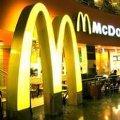McDonald's Faces Possible Lawsuit Over Fast-Food Marketing to Kids
Since 1979, every McDonald's "Happy Meal" for children has included an enticing toy along with the food, from Star Wars action figures to Hello Kitty watches. The Washington-based Center for Science in the Public Interest, or CSPI, notes that a 2005 report from the U.S. Institute of Medicine found that marketing to children makes them more likely to ask for and eat unhealthful foods.
Nearly one in five children in the United States is obese, according to the U.S. Centers for Disease Control and Prevention. That means more kids are developing diabetes and are at higher risk of heart disease and other health problems.
CSPI Executive Director Michael Jacobson says it's wrong to tempt kids with toys. "The very practice of dangling a toy or other premium to get kids to pester their parents to go into the restaurant and buy food, junky or nutritious, is unethical and, we believe, illegal." And the food is more often junky than nutritious, Jacobson adds. All of the 24 Happy Meal choices have more than a third of a child's recommended daily calorie intake. A Happy Meal that includes a cheeseburger, French fries, and a soda contains half a day's worth of calories and saturated fat, along with nearly a day's worth of sodium, and two day's worth of sugar. CSPI is threatening to sue under consumer protection laws in several states. Lead attorney Stephen Gardner says he's confident he can face a jury and ask three questions: "Is it unfair for McDonald's to bypass parents and market direct[ly] to little children? Is it wrong for McDonald's to trick little kids into nagging their parents to buy the Happy Meals? And does McDonald's practice hurt little kids? The jury would come back yes, yes, and yes." In a written response, McDonald's spokesman William Whitman says he couldn't disagree more with CSPI. The toy is just part of a fun, family experience, he says, and Happy Meals offer more healthful choices than ever, including low-fat milk instead of soda and apple slices instead of French fries.
The company sold nearly 120 million liters of milk in the past year, he says, and more than 100 million Happy Meals with Apple Dippers since 2008.
The statement doesn't say what McDonald's plans to do about CSPI's threatened lawsuit, and a spokeswoman wouldn't elaborate in emails. It's not the first time CSPI has threatened legal action against junk food makers -- and the strategy has worked before. The makers of sugary breakfast cereals changed how they market to children, and the fast-food chicken dinner chain KFC stopped frying its food in artery-clogging, high-trans-fat oils after the group threatened to sue.
CSPI says McDonald's has 30 days to change its ways, or the group will go to court.

